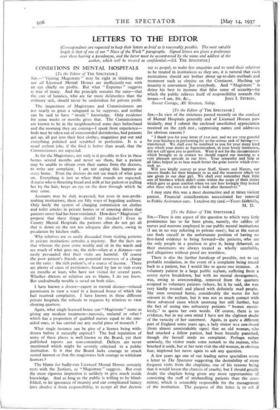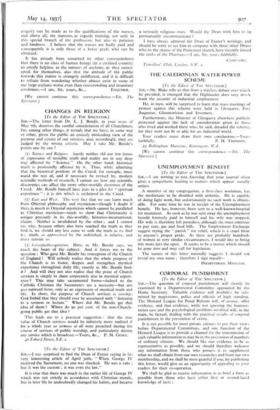Sta,—There is one aspect of the question to which very
little
[To the Editor of THE SPECTATOR.]
prominence has so far been given, namely, the calibre of nurses and matrons employed in our public mental institutions (I am in no way referring to private ones); but at the outset one finds oneself in the unfortunate position of having no first-hand evidence to bring forward—the patients, who are the only people in a position to give it, being debarred, as their statements are always treated as wholly unreliable, and allegations without proof are worthless.
There is also the further handicap of possible, not to say probable retaliation, in the event of a complaint being traced back to a patient, but I would like to quote one instance. A voluntary patient in a large public asylum, suffering from a severe nerve breakdown, but with no mental derangement,
was, owing to overcrowding, removed from the quarters -assigned to voluntary patients (where, let it be-said, she was
very kindly treated) and placed with definitely mad people. She soon returned home, considerably the worse for her sojourn in the asylum, but it was not so much contact with these advanced cases which unstrung her still further, but the fact of seeing two refractory patients " beaten merci- lessly," to quote her own words. Of course, there is no evidence, but in my own mind I have not the slightest doubt of the veracity of her statement. Again, in quite a different part of England some years ago, a lady visitor wes convinced (from almost unmistakable signs) that an old woman, who had attacked a fellow patient, had been brutally punished, though she herself made no complaint. Perhaps rather unwisely, the visitor made some remark to the matron, who brushed it aside, but at her next visit the old woman, in obvious fear, implored her never again to ask any question.
A few years ago one of our leading nerve specialists wrote a letter to The Spectator suggesting the desirability of more frequent visits from the chaplains, one of his reasons being
that it would lessen the chances of cruelty, but I should greatly doubt the chaplain being given any more opportunities of convicting the staff of mishandling patients than the corn- mince, Which is ostensibly responsible' for the management of the institution. The purpose of this letter is to ask if enquiry can be made as to the qualifications of the nurses, and above all, the matrons, as regards training, not only in this special branch of the profession, but also in patience and kindness. I believe that the nurses are badly paid and consequently it is only those of a lower grade who can be obtained.
It has already been remarked by other correspondents that there is no class of human beings (in a civilised country) so utterly helpless as the inmates of asylums, as they cannot speak for themselves, also that the attitude of the public towards this matter is strangely indifferent, and it is difficult to refrain from wondering whether abuses exist in some of our large asylums worse even than overcrowding and insanitary
conditions.—I am, Sir, yours, &c., ENQUIRER.
[We cannot continue this correspondence.—En. The Spectator.]















































 Previous page
Previous page